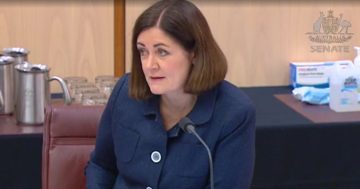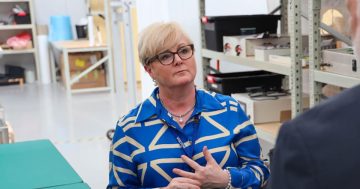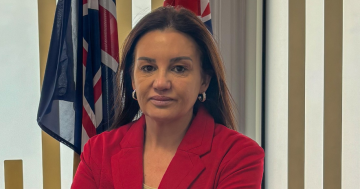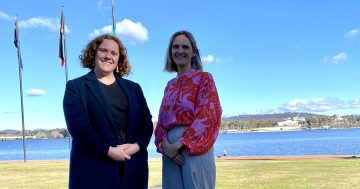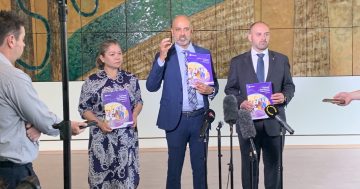In the second in our series of Federal Election candidate Email Interviews we bring you Emma Davidson – the lead ACT Senate candidate for What Women Want Australia.
Emma Davidson’s responses, in full and unedited, can be found below:

Question 1: Provide a short (no greater than 200 word) employment application style Resume (CV), including what work have you done apart from being a politician or political staffer or party/union/lobby employee and what experience or qualifications you have with regards to economic management?
I have never worked as a politician or political staffer. Since joining the workforce in 1993, I have spent seven years at Centrelink, two years in a private IT firm, and five years at Defence. I am currently chasing after three children, and working on a small home-based business dedicated to environmentally sustainable and fair trade parenting products.
I know how hard, and rewarding, it is to balance work and family, having worked full time with babies under six months old. And I know that working part time doesn’t necessarily make it easier!
My university qualification is a Bachelor of General Studies (another name for a BA). The subjects in my degree are a mix of law, IT, and communications/media.
The most important thing I can do in the Senate is request amendments to Bills that bring them into line with the policies of What Women Want: better resourcing for health, education, environment issues, and work/family balance. However, I am mindful of the cost. For example, I think it would be a better use of $88m to spend it on indigenous health services – not the administrative costs of quarantining welfare payments for people in indigenous communities.
Question 2: What would you like to see as the first piece of legislative change brought about by your Government? What are your personal goals for your first year representing the ACT?
Our Senate candidates can make a powerful impact on legislation raised by whoever is in government, in the form of amendments. We only need one Senate candidate to make a significant difference.
I would like to make a real difference to healthcare in the ACT. Our hospitals are desperately under-resourced, we don’t have enough GPs let alone enough bulk-billing GPs. We need more preventive care and early intervention, especially for mental health. Medicare should be extended for dental, midwifery, physiotherapy, and other proven complementary healthcare. This would help reduce the number of people needing acute hospital care, especially low income earners.
Education is another issue close to my heart. You might remember me as an active Save Melrose campaigner in 2006. We need better resourcing for early childhood education, as well as equity between public and private school funding. We also need to abolish HECS as part of providing fairer higher education – this is an investment in Australia’s economic future.
The environment crisis needs immediate action. We can ensure long-term water resources through cross-border cooperation. Reduce, Reuse, Recycle is the way to go with water – free rainwater tanks to every house could be more economical and more effective than building another dam. Our climate change policy includes strategies to reduce our greenhouse gas emissions by 50% below 1990 levels by 2020; a 90% reduction by 2030; and to net zero by 2040. We need to start working towards these goals immediately if we are to achieve them.
Question 3: What private opinions do you hold which are different to those of your party?
On which issues do you disagree with your Party’s stated position?
I agree with all the policies of What Women Want. I am impressed with how responsive the policy team are to suggestions for improvement.
Question 4: Are you in favour of fixed election terms? Why or why not and if so what length of term are you in favour of and why?
After the farce of waiting for Howard to call the 2007 election, I can see good reasons for a fixed election date. I don’t hold a strong opinion on the length of term, but it should be long enough to achieve changes in policy without allowing the government to become stale in their ideas.
Question 5: Do you think that it is important for the Prime Minister and their family to live in Canberra? Why or why not?
Yes. It makes perfect sense for the PM to be close to the Departments that implement government policies. It’s an insult to Canberrans that our PM isn’t living in the national capital.
Question 6: Do you consider that making observations about the structure and makeup of the other major political party as beneficial to your own party’s role in the election?
It is worthwhile being aware of the corporate sponsorship that could be influencing the policies of the parties you are voting for.
It is also useful to consider the personal bias (often subconscious) that all human beings bring to their decision-making. This is why it is so important that our Senate, as a House of Review, reflects the diversity of Australian culture. We need more women, young people, indigenous people, people with disabilities, and people from other cultural backgrounds in our Senate.
Question 7: What are you thoughts on the permanent trading of water entitlements, as per The National Water Initiative (http://www.dpmc.gov.au/water_reform/nwi.cfm), and do you believe that giving water a tradable, economic value is really the best method to ensure that this scare Australian resource will be utilised sensibly in the future?
Reducing our water use is something we need to do immediately. Increasing the price we pay for water is one way to do this, but we need to ensure that low-income earners can still access clean water. We also need to make changes so that big business, who can pay higher water costs and pass it on to consumers in the cost of the end-product, have non-financial reasons to reduce water use, and support in achieving reductions. One of the problems with the government’s approach to the water crisis is that they aren’t able to work cooperatively with State governments. Without a cooperative approach, any change is doomed to failure.
Question 8: Canberra has a large student population and Govt funding per capita for public education facilities seems to be on the slide with there being an apparent shift towards encouraging more people to enter the private education sector. What are your thoughts on this?
We want to see equity in education funding. Public schools should be funded to provide a quality education for all Australians, not just those who can’t afford private schools.
What initiatives would you pursue in regard to HECS fees, full fee paying uni courses, increasing/decreasing Austudy payments, funding for education/ R&D/communications infrastructure and assistance or encouragement to private sector research and technology companies?
The HECS system burdens young people with debt. We support abolition of HECS fees as part of a fairer higher education system, where university entry is based on merit rather than money. Having to repay interest-free loans of tens of thousands of dollars is also a problem for mature-age workers who need new qualifications as part of a career change. A well-supported university system is an investment in Australia’s economic future, as it enables us to trade in knowledge and ideas.
We also support investment in renewable energy as part of our climate change policy. ANU has set a great example with its solar power research. Our universities should be celebrated as innovators, often producing long-term and expensive research that would not be commercially viable in the private sector.
What measures will you take to ensure the best possible education is available to all Australians?
We can start with improving early childhood education funding, progress through equity between public and private school funding at primary and secondary level, and complete the picture with a fairer higher education system for all Australians. I would be looking for ways to include these requirements in any relevant Bills once they reach the Senate.
Question 9:What’s the single most pressing issue in your electorate (local electorate issue – not a broader issue that has an impact on your electorate) and how do you plan on addressing it?
Public health. I know this is a problem across Australia, but Canberra is in a particularly bad position. We have some of Australia’s worst emergency department waiting times, the country’s highest out-of-pocket GP costs and some of Australia’s lowest GP bulk billing rates, and we provide care for ACT residents as well as our NSW neighbours. The Commonwealth blame ACT Government mismanagement; the ACT Government blames lack of federal funding. The two tiers need to work cooperatively to resolve the health crisis, for Canberrans as well as nearby NSW.
Apart from the obvious under-resourcing issue, we can improve our hospital report card by keeping people out of acute care. Let’s put more resources into preventive care and early intervention, especially for mental health. We can also extend Medicare to cover dental, midwifery, physiotherapy, and other complementary health services. Yes, it will be expensive – but it will reduce our hospital costs, and provide better long-term health care for everyone.
Question 10: Suppose that you and I are stuck in an elevator for 5 minutes. You know nothing about me other than I’m enrolled to vote in your electorate. What do you say to convince me to vote for you.
As a busy breastfeeding mother, I have a stash of energy snacks in my handbag. So I’m a good person to know if you’re stuck in a lift!
Enough of the arguments between Commonwealth and ACT governments. Let’s just get on with fixing our broken health and education systems, do something serious and long-term about water and climate change, and make Canberra a better place to live.
As a Senator, I will use my vote to support Bills that meet these goals. I’m not interested in adversarial politics. I am here because I want to create positive change in Australian society. And I want to know what would make life better for you. So… what do you think needs to change?












